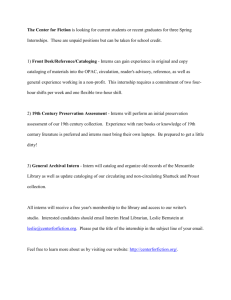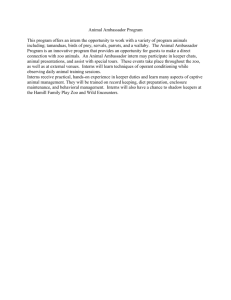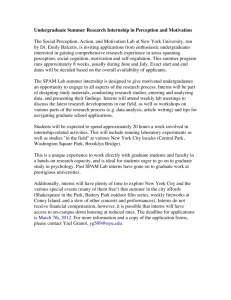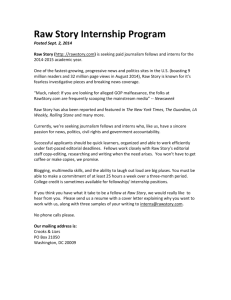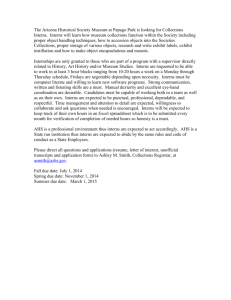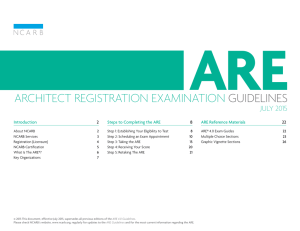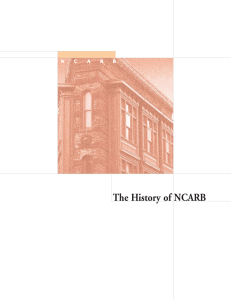dEFiNiNg YouR moRAL ComPASS
advertisement
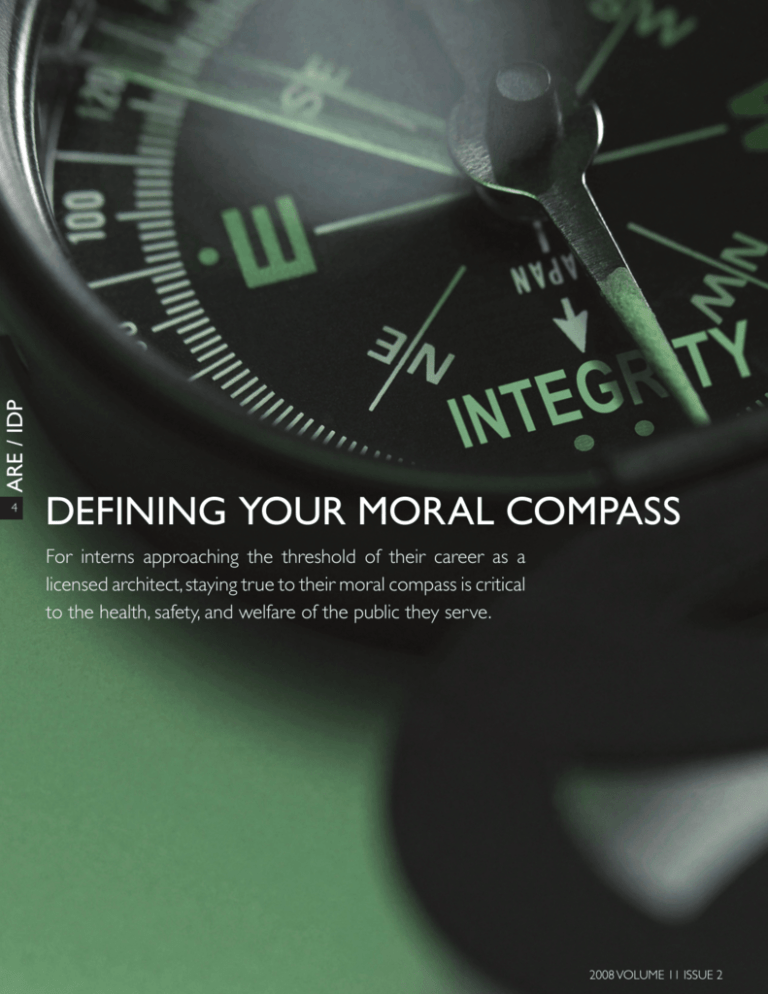
ARE / IDP 4 Defining Your Moral Compass For interns approaching the threshold of their career as a licensed architect, staying true to their moral compass is critical to the health, safety, and welfare of the public they serve. 2008 Volume 11 Issue 2 As professionals, architects are expected to develop a moral compass by which they navigate ethical dilemmas that arise in professional practice. These dilemmas exist in every facet of practice—from how to handle challenging client situations to interpreting life-safety codes. This commitment to ethical and honest practice is mandated by the profession’s responsibility to protect the health, safety, and welfare of the public. For interns approaching the threshold of their career as a licensed architect, staying true to their moral compass is critical to the health, safety, and welfare of the public they serve. The process of becoming licensed offers numerous opportunities for interns to demonstrate their moral maturity by adhering to rules established for education, internship, and examination. The integrity of the educational process is the responsibility of the institution granting the degree. However, the integrity of the internship and examination components is the responsibility of the intern and the profession. INTERN DEVELOPMENT PROGRAM The Intern Development Program (IDP) is a comprehensive training program that assists interns, as emerging professionals, in acquiring the discipline, integrity, judgment, skills, and knowledge necessary to legally practice architecture independently. Although IDP is a rigorously structured program, it is largely based on the honor system. As part of the program, interns are required to complete training reports that document their experience in specific training areas and have them approved by their supervisors. When interns submit inaccurate training reports, they put their supervisor in a compromising position. Some interns exaggerate their training hours in an attempt to rush through the IDP. By doing so they not only shortchange their own internship experience, they also devalue the process and ultimately weaken the profession. By choosing to honestly report their training experience, interns demonstrate a commitment to themselves and to the integrity of the process and the profession. The responsibility to uphold the IDP extends beyond the interns, to include supervisors and mentors. These individuals influence the quality and effectiveness of each intern’s experience in the program. By guiding their interns’ professional development, supervisors and mentors provide an important service to the profession. For many seasoned architects the current process of becoming licensed is vastly different than what they went through. However, before taking on the role of supervisor or mentor, it is important for them to understand the IDP process. They need to be familiar with the training areas and understand how training requirements are satisfied. Supervisors and mentors must make time to review their interns’ progress and help interns develop * From Professional Practice: 101 Business Strategies and Case Studies in Architecture (John Wiley & Sons, Inc., 2006) by Andrew Pressman, FAIA DIRECT CONNECTION: A PUBLICATION OF NCARB ARE / IDP “Architects must zealously guard their reputation for integrity, and a review of some of the basic principles of ethics, personal and professional, is vital to one’s career, especially as one enters practice.” — George Wright, FAIA.* 5 a plan to complete the program in a timely fashion. Ultimately, supervisors and mentors must be accessible to their interns and committed to the IDP process. ARE and your moral compass Before taking any division of the ARE, candidates are required to accept a confidentiality statement, which prohibits any disclosure of exam content before, during, or after the exam. A training program based on an honor system of self-evaluation can only be as worthwhile as each participant chooses to make it. Interns, supervisors, and mentors have an opportunity to show their dedication to the future of the profession of architecture and the integrity of the registration process by taking IDP seriously. Interns who inaccurately report their training or supervisors who blindly sign training reports undermine the program and the quality of the internship experience, which can ultimately endanger the public’s confidence in the profession. ARE / IDP ARCHITECT REGISTRATION EXAMINATION The Architect Registration Examination® (ARE®) is designed to protect the health, safety, and welfare of the public by providing a psychometrically justifiable and legally defensible process that measures the level of competency necessary to practice independently. To become licensed, candidates must pass multiple divisions that test their ability to perform many of the tasks an architect encounters in practice. 6 Policy Regarding Cheating and Disclosure Adopted by Board of Directors April 2005 That staff and counsel be authorized to investigate alleged cheating and attempts to disclose the substance of ARE questions and to take appropriate action. Such action may include holding scores and suspension of future ARE testing privileges pending resolution of the matter and, with the approval of the president, commencing legal action against any person threatening the integrity of the ARE; and That such actions may include referral of the matter to the Committee on Professional Conduct for its recommendation to the Board. Such recommendations may include the cancellation of ARE scores and the suspension of future ARE testing for up to three years from NCARB’s discovery of the incident, or such longer period as may be warranted in exceptional circumstances; and in appropriate circumstances seeking recovery of costs and civil damages in a court of law; and That the Member Board making such individual eligible for the ARE be informed of NCARB’s action and that such action be retained in records maintained by NCARB with respect to such individual. Passing a professional exam—like the Bar, the National Medical Licensing Exam, and the ARE—can be a daunting task. However, upholding the integrity of these exams is essential to the process of becoming a licensed attorney, doctor, or architect. Candidates who sit for the ARE agree to the rules by which it is administered. These rules, clearly spelled out in the ARE Guidelines, include: test center regulations, grounds for dismissal, the Confidentiality Agreement, and the NCARB Board of Directors’ Policy on Disclosure and Cheating. The consequences of violating the rules are expressly spelled in the Confidentiality Agreement, which candidates must accept prior to the delivery of every ARE division. The vast majority of people who take the ARE respect and abide by the rules. Unfortunately, there are some candidates who choose to disregard the Confidentiality Agreement by sharing content and/or questions from their exam with other test takers. Since 2005, seven 2008 Volume 11 Issue 2 The integrity of the ARE is challenged on a daily basis by the dissemination of exam content. Potential violations of the Confidentiality Agreement are most evident in internet chat rooms. Thousands of people participate in internet discussions relating to the ARE. When used appropriately, the internet is an excellent tool for gathering study resources and bonding with fellow candidates about test center experiences. It is also, however, a place where rules that are written in black and white become dangerously grey. Additionally, people should not ask someone “to be more specific” about their exam experience—and candidates must not elaborate when they are asked. These types of questions should raise concern among test-takers who are serious about the ethical implications of being a professional. After years of education and training, the number of candidates willing to risk their career in architecture for associates they meet in internet chat rooms is alarming. To protect themselves, people who post on the internet should consider the character of those they correspond with and carefully think about the potential consequences of their interactions. Candidates who value the online chat rooms must demonstrate their professional integrity and police their own. It should not be necessary for NCARB to “police” the internet for possible dissemination of exam content. Any action that compromises the ARE ultimately undermines the health, safety, and welfare of the public. One area of particular concern is the assembly of a “master list” that outlines material covered in the exam. Study guides are a valuable resource for exam candidates. However, lists that disclose specific exam content are unacceptable. Inappropriate disclosure of exam content is not limited to divulging information from one’s personal experience. Many internet posts are a compilation of ARE information originally provided by other candidates. If this information includes exam content, then the reposting of this information is potentially a violation of the Confidentiality Agreement—whether it occurs “before, during, or after the exam.” The ARE is a vital component of the process by which NCARB’s Member Boards qualify architects to practice in their jurisdictions. Any action that compromises the ARE ultimately undermines the health, safety, and welfare of the public. As a profession, there is an expectation of honest and ethical practice. This expectation extends to those pursuing a license. Whether enrolled in IDP, supervising or mentoring an intern, or a candidate for the ARE, each individual must define their own moral compass and adhere to the highest levels of ethical and professional behavior. DC There is also the ongoing question about “paraphrasing.” How much is too much information? The answer is clear. Any specific information that identifies the nature of a question is not allowed. This includes disclosing or inferring specific vocabulary and exam content. Candidates should limit their post-exam discussions to general terms about the experience itself and avoid all references to exam content. DIRECT CONNECTION: A PUBLICATION OF NCARB IDP and your Moral Compass When interns submit their Employment Verification Forms they must sign a statement certifying that all information is correct: “I hereby authorize NCARB to make inquiries of the person listed below with respect to my background and character. I invite full and complete response to all inquiries. I release said person from any and all claims, including claims for libel and slander, which may arise out of the communication of any information to NCARB. I hereby certify that all information I furnish herein or attached hereto is correct.” IDP Infractions and Consequences When interns submit reports that misrepresent their employment duration, training units, and/or training settings, they commit an IDP infraction. Supervisor infractions include refusing to certify training reports without cause and certifying reports that contain false information. At a minimum, the consequence of submitting an inaccurate report could result in the loss of training units. Depending on the severity of the infraction, the case may be referred to NCARB’s Committee on Professional Conduct. ARE / IDP people have had testing privileges suspended and scores cancelled for dissemination of exam content. In recent months, several additional candidates have been investigated. At least two cases have been referred to NCARB’s Committee on Professional Conduct. The review of other cases is ongoing and may result in further sanctions. 7
